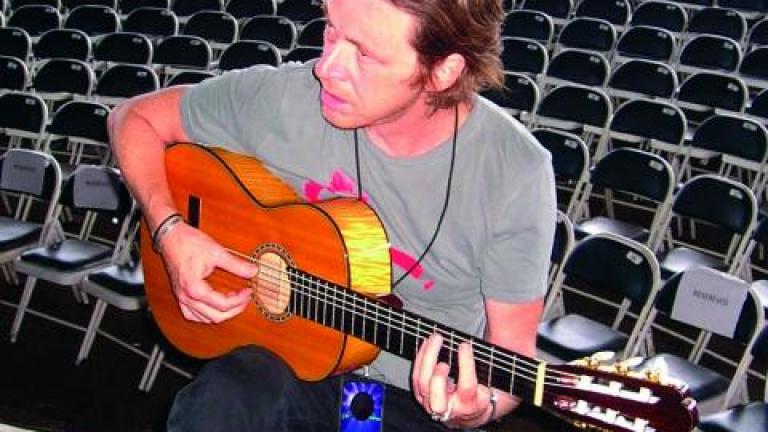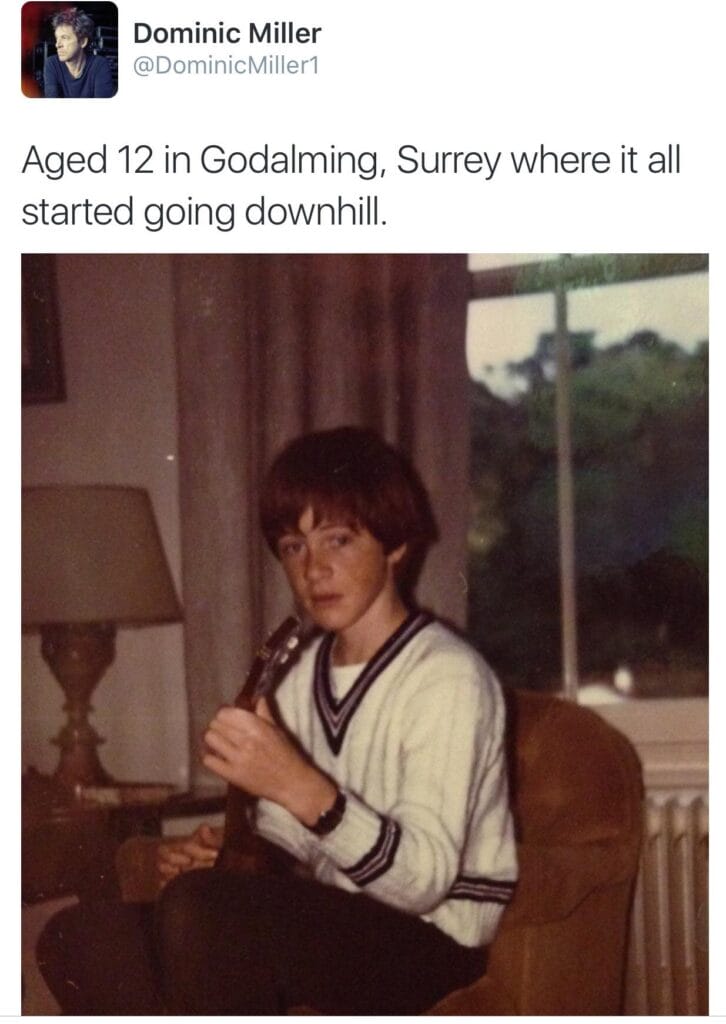16歳:バークリー入学までのドミニク
ドミニクは10歳くらいまでアルゼンチンに居て、その時にお姉さんのジュリーやお父さんからアコースティック・ギターを教わります。アルゼンチンにはどの家庭にもアコースティックギターは置いてあるのが普通だそうで、それは大変自然な事だったようです。
最初は主にボサノヴァのような曲を演奏していて、その後、お姉さんにビートルズのイエロー・サブマリンを教わったり、ローリング・ストーンズを演奏したり、音楽の幅を広げていきます。この頃、周りにはあまりビートルズやストーンズを演奏する人は居なかったようです。
お父さんの転居に伴いアメリカに移住後、1972年に一度ロンドンに転居。しかし15歳の時にまた再びアメリカ、ウィスコンシン州のラシーンへ戻ります。この頃からドミニクは先生に師事して本格的にクラシックギターを学びはじめます。またエレキギターも弾き始めます。そしてこの年に初めて人前で演奏し、報酬を得ます。
この時の話をドミニクはこう語っています。「私は15歳で、ウィスコンシン州ラシーンで、ザ・ラヴ・エクスプレッションズというバンドを組んでいた。クラブで演奏したんだけど、バンドだけでなく、建物全体で白人は僕だけだった。ただのカヴァー・バンドだったけど、いい経験だったし、本当に楽しかった。」
そして、彼はこの頃既にプロミュージシャンとして生きていく事を決意していました。1976年にロンドンへ移住。名門ギルドホール音楽演劇学校学校に入学し、78年までクラシックを中心にギターを学びます。
また、1976年にはアメリカのボストンにあるバークリー音楽大学のサマープログラムに参加。ドミニクは、この経験はとても重要で、大きな発見だったと語っています。他の学生たちがどれほど熱心に練習し、音楽に対してどれほど真剣で、音楽家としてどのように生きているのかという大きな刺激だったそうです。彼らのそのコミットメントのレベルの高さに驚いたのです。
■ 世界を飛び回るサイドマンの思い ■
1990年以来、ドミニク・ミラーはスティングのバンドのメンバーとして、世界中で1,000回を超えるコンサートで彼のバックを務め、イギリスのスーパースターと曲を共作したこともある。
ギタリストのドミニク・ミラーはアルゼンチンのブエノスアイレス生まれだが、長年イギリスに住んでいたため、イギリス訛りが強い。11歳ごろからギターを弾き始め、16歳のときにバークリーのサマー・プログラムに参加した。ミラーは、バークリーのミュージシャン仲間たちのコミットメントの高さを目の当たりにし、ミュージシャンとしての仕事に対する姿勢に大きな影響を与える、人生を変えるような気づきを得たと言う。
ロンドンのギルドホール音楽演劇学校で学んだ後、ミラーはロンドンのバンドで演奏し始め、セッションの仕事を探し始めました。 パーカッショニストのマイルズ・ボウルドは彼を説得して、フリー・セッションで演奏させ、プロデューサーのヒュー・パジャムが彼の演奏を聴いた。 パジャムはミラーをセッションに呼ぶようになり、これがきっかけとなり、ミラーのギター演奏はフィル・コリンズの世界的大ヒット曲「アナザー・デイ・イン・パラダイス」の不可欠な要素となった。
その間、ミラーは自身のアルバム8枚とスティングのアルバム7枚を含む200枚以上のアルバムに参加。11990年以来、ミラーはスティングのバンドのメンバーとして、世界中で1,000回を超えるコンサートで彼のバックを務め、英国のスーパースターと曲を共作したこともあります。ロンドン・フィルハーモニック・コンサート・オーケストラとのスティングのシンフォニシティ・ツアーがボストンを通過した7月、ミラーはサイドマンやツアー・ミュージシャンとして長く活動出来る為に必要なことについての見解を述べました。
スティングという音楽大学
Q:1989年、ヒュー・パジャムはあなたの演奏の何を聴いて、セッションに呼ぶようになったのですか?
DM : 彼は、私がナイロン弦、アコースティック、エレクトリック・ギターをシームレスに行き来できるというアイデアに惹かれました。でも、それよりも全体像を理解し、プロジェクトを理解することが重要でした。セッション・ワークには、あなた、アーティスト、プロデューサーのトライアングルがあります。この3人の間の力関係を理解し、自分の役割を理解しなければなりません。アーティストとプロデューサーのどちらを聴いていますか?ヒューと私はとても意気投合し、後に彼はシンガー、ジュリア・フォーダムのアルバム『Porcelain』に私を招待してくれました。彼がフィル・コリンズのアルバムをプロデュースしていたとき、『…But Seriously』への参加を依頼されました。2それが私にとって大きな瞬間でした。
Q:スティングと仕事をするようになったきっかけは?
DM : スティングがギタリストを探していて、ヒューが私を推薦してくれたんです。ヒューはポリスのアルバムやスティングのソロアルバムを数多くプロデュースしていました。それで私はオーディションのためにニューヨークに飛び、20年経った今でも彼と一緒に演奏しています。
Q:いろいろな角度からスティングとプレーできるのは素晴らしいことでしょう。
DM : 確かにその通りで、私はこの仕事に最大限の敬意を持って取り組んでいます。 私はこのギグに満足していない。 周りの人は皆、私が常にライブに参加できると思っているが、スティングの場合、決まっていることなど何もありません。スティングは私たちに、常に音楽を発展させ、新しいことに挑戦することを望んでいます。彼は毎晩同じものを聴きたがらないんです。私にとっては毎日が素晴らしい機会です。
Q:スティングとの仕事を音楽大学に例えたことがありますね。
DM : そんな感じです。私は彼と一緒に音楽的に成長してきました。そして、大胆な言い方をすれば、彼も私と一緒に成長してきたのです。私たちは2人とも、実にさまざまなタイプの音楽に興味を持っていて、それがこのギグなのです。まるで私たちは役者で、台本を与えられているかのようです。
多様性が鍵です。ボサノバとロック、カントリーとファンク、クラシックとジャズを混ぜ合わせたユーモアがギャグです。 彼はそれを理解してくれる人々に囲まれることを好みます。 もし彼が私に、クラシックな雰囲気のあるものの上でカントリーのものを演奏してほしいと頼んだ場合、私はそれがうまくいくとは思わないと彼に言っても仕方ありません。 何年にもわたって多くの人々と演奏してきた結果、私はスティングの音楽に居場所を見つけ、彼はさまざまなシナリオに喜んで適応するギタリストを見つけました。
“スティングのバンドのドミニク・ミラー “であることを気にしているのかと聞かれることがあります。もちろん、そんなことは気にしていません。最高のミュージシャンと一緒に演奏できるのですから。スティングの大学を通して、ヴィニー・カリウタ、ブランフォード・マルサリス、ケニー・カークランドなど、その道のスペシャリストと世界一流の音楽性を見てきました。そのすべてが私の音楽性を向上させてくれました。アレンジや曲の形、作曲についても多くを学びました。素晴らしい旅です。
Q:その教育の一端は、スティングとの曲作りにあるのでしょうか?
DM : 彼と一緒に曲を書くことは、特権であり、さまざまなレベルでの教育です。作曲のスキルを教えてくれたし、アイデアを見つけたときにそれをどう認識するか、そしてそれを使って何かをする方法を教えてくれました。インスピレーションは重要ですが、作曲家の中にはあるアイデアを見つけてそれを繰り返すだけで、自分を安売りする人もいます。時には逆算して、そのアイデアを補完し、他の可能性を見つけなければなりません。スティングとは、シンプルなアイデアで音楽の旅に出ること、そしてそのアイデアで何かを作ることを学びました。
(曲は)「シェイプ・オブ・マイ・ハート」がいい例ですね。 家中を駆け巡るようなギターのモチーフがあったんだけど、スティングはこう言ったんだ。「ここでやめて、このアイデアに取り組みましょう。」彼はそれを曲として機能させる方法を認識していました。私だったら絶対にやらなかったでしょう。
ミュージシャンとして長く活動する為の秘訣
Q:ツアー生活を上手に暮らす術はあるのでしょうか?
DM : あると思います。いろいろな方法でやってきましたから。最初にこの仕事を得たときは、宝くじに当たったようなものでした。皆さんが想像するような方法で、私はちょっとおかしくなってしまいました。自分自身を大切にする必要があります。指だけでなく、体全体を使って演奏しているのですから。
旅は体に負担をかけます。食事や飲酒など、自分のペースを守らなければなりません。睡眠不足は本当に疲れます。今は常に十分な休息をとり、適度な健康状態を保つようにしています。週に5、6日はヨガをしています。旅には最高の強壮剤です。お酒もドラッグもやりません。それが唯一の方法だとは言いませんが、私にとっては唯一の方法です。
また、プロジェクトに常に関心を寄せ、熱意を持ち続けることも必要です。熱意がなくなったら、家に帰るべきです。私は旅先で音楽を練習するのが好きです。好きな練習曲はバッハだけです。音階を弾くのは嫌いですが、バッハのヴァイオリンのためのソナタとパルティータという偉大なバイブルから弾くことでその問題を回避しています。すべてがそこにあります。音階には個性と美しさがあり、その音楽を演奏する方法はたくさんあります。私は曲をとてもゆっくり弾くのが好きで、ヨガのようなアプローチをしています。
ツアーというのは非常に厳しい環境なので、自分がやり遂げたと思って満足してはいけないんです。そうすれば、失敗し始めるでしょう。私のボスは、私のベストを尽くして当然なのです。毎晩同じ曲を演奏していると、簡単に飽きてしまいます。日々のプロジェクトに敬意を払い、ゆっくり練習することで自分のアプローチや演奏を解体しなければなりません。
シンフォニシティ・ツアーはかなりハードです。スティングは一度ツアーに出ると、私たちがツアーを終えるまでツアーに出続けます。2年に及ぶこともあります。ツアー中に2回誕生日を迎えたこともあります。
自分自身の音を持つ事の重要性
Q:あなたの長期的な目標は何ですか?
DM : 大きな目標は、ミスをせずにバッハをプレーすること!それはとんでもない目標で、とても難しいことです。また、自分のサウンドも向上させたいと思っています。多くのギタリストは、いい音を出すことの重要性を軽視しています。それはあなたの声です。ギターはアイデンティティを持つのが難しい楽器です。とても純粋に演奏していれば、良い音になるものです。やがて人々は、あなたがその音をどうやって手に入れたのか聞いてくるようになるでしょう。それは最高の賛辞です。それはプレイヤーとしてのあなたのちょっとしたフレーズのアイデアのセンスやボキャブラリーではありません。偉大なプレイヤーを真似ることはできますが、あなたには自分の音がありますか?
私の目標は、自分の音を改善することです。いつまでたっても終わらないし、苦労の連続です。若い頃より、今の方が学生気分です。未知の目的地への片道切符を手にしたのですから。まだ旅の途中です。辿り着けないことはわかっているけれど、それが好きなんです。私はこの終わりのない音楽の旅を楽しんでいます。
Age 16: Dominic before entering Berklee.
Dominic stayed in Argentina until he was about 10 years old, when his sister Julie and his father taught him to play the acoustic guitar. He says that in Argentina it is normal for every household to have an acoustic guitar, so it was very natural for him.
At first he mainly played songs like Bossa Nova. Later, his sister taught him the Beatles’ Yellow Submarine, he played the Rolling Stones and expanded his musical range. At that time there were not many people around who played the Beatles or the Stones.
After his father was transferred to the USA, he went to London once in 1972. However, at the age of 15 he returned to Racine, Wisconsin, USA. It was at this time that Dominic began to study classical guitar in earnest with a teacher. He also began to play electric guitar. And this year he gets paid to perform in public for the first time. Dominic described this episode in this way.
“I was 15 years old, in Racine, Wisconsin, with a band called The Love Expressions, which was a soul band I joined at school. We played in a club and I was the only white person, not only in the band but in the whole fucking building. It was just a covers band, but it was a great experience and I really enjoyed it.”
And by this time he had already decided to live as a professional guitarist. In 1976 he moved to London and enrolled at the prestigious Guildhall School of Music and Drama, where he studied guitar, mainly classical, until 1978.
He also attended a summer programme at the Berklee College of Music in Boston, USA in 1976. Dominic says that this experience was very important and a great discovery.
He says it was a great inspiration to see how hard other students practised, how serious they were about music and how they lived their lives as musicians. Dominic was amazed at high level of their commitment to music.
■ Thoughts from a Globetrotting Sideman ■
Since 1990, Dominic Miller has been a member of Sting’s band, backing him in more than 1,000 concerts across the globe, and has even cowritten songs with the British superstar.
Although guitarist Dominic Miller was born in Buenos Aires, Argentina, he speaks with a pronounced British accent, a result of his many years living in England. He began playing guitar at about 11 and participated in a Berklee summer program when he was 16. Miller says the level of commitment he saw among his fellow Berklee musicians was an eye-opener and provided a life-changing realization that profoundly affected his work ethic as a musician.
After studies at London’s Guildhall School of Music & Drama, Miller began playing in London bands and seeking session work. Percussionist Miles Bould persuaded him to play a free session in which producer Hugh Padgham heard his playing. Padgham began calling Miller for sessions, which led to the opportunity for Miller’s guitar work to become an integral component of the massive worldwide hit song “Another Day in Paradise” by Phil Collins.
In the intervening years, Miller has been featured on more than 200 albums, including eight of his own and seven by Sting. 3Since 1990, Miller has been a member of Sting’s band, backing him in more than 1,000 concerts across the globe, and has even cowritten songs with the British superstar. In July when Sting’s Symphonicity tour with the London Philharmonic Concert Orchestra passed through Boston, Miller offered his observations on what it takes to attain longevity as a sideman and touring musician.
Music college called Sting.
Q: What did Hugh Padgham hear in your playing in 1989 that prompted him to start calling you for sessions?
DM : He was attracted to the idea that I could go between nylon-string, acoustic, and electric guitars seamlessly. But it was more about an understanding of the big picture and understanding the project. There is a triangle in session work between you, the artist, and the producer. You have to understand the dynamics amongst the three and understand your role. Who are you listening to: the artist or the producer? Hugh and I hit it off really well, and he later invited me to play on the album Porcelain by singer Julia Fordham. When he was producing the Phil Collins album “. . . But Seriously”, he asked me to play on it.4 That was my big moment, because everything opened up after that.
Q: How did you come to start working with Sting?
DM : Sting was looking for a guitarist, and Hugh recommended me. Hugh had produced many of the Police albums and Sting’s solo albums. So I flew to New York for the audition, and now 20 years later, I’m still playing with him.
Q: It must be great to play with Sting from many vantage points.
DM : It certainly is, and I treat the job with the utmost respect. I’m not complacent with this gig. Everyone around me thinks I’ll always have the gig, but nothing is a given with Sting. He wants us to stretch the music and try new things all the time. He doesn’t want to hear the same things every night. It’s a fantastic opportunity every day for me.
Q:You’ve compared working with Sting to being at a music university.
DM : It is kind of like that. I’ve grown up musically with him. And if I might be so bold, he’s grown up with me. We’re both interested in so many different types of music, and that’s what this gig is about. It’s as if we are actors and we’re given a script.
Diversity is the key. It’s the humor in mixing bossa nova with rock or country with funk or classical with jazz that’s the gag. He likes to surround himself with people who get that. If he asked me to play country things over something with a classical feel, it would be no good for me to tell him that I didn’t think it would work. After years of playing with so many people, I’ve found a home in Sting’s music, and he’s found a guitarist who is willing to adapt to different scenarios.
Some people ask me if I mind being “Dominic Miller of Sting’s band.” Of course I don’t mind that; this is arguably the best day job in the world. I am getting to play with the best musicians around. Through the university of Sting, I have seen world-class musicianship with Vinnie Colaiuta, Branford Marsalis, Kenny Kirkland: people who are specialists in their field. It has all improved my musicianship. I’ve learned a lot about arranging, song form, and writing. It’s an amazing journey.
Q:Has part of this education come from cowriting songs with Sting?
DM : Writing with him is a privilege and an education on many levels. It’s taught me compositional skills, knowing how to recognize when I’ve found an idea, and then doing something with it. Inspiration is one thing, but some composers sell themselves short by finding an idea and just repeating it. Sometimes you have to work backwards and complement that idea and find other possibilities. With Sting, I’ve learned about going on a musical journey with a simple idea and making something of it.
[The song] “Shape of My Heart” is a good example. I had a guitar motif that went ’round the houses, but Sting said, “Stop here; let’s just work with this idea.” He recognized a way of making it work as a song, and I never would have done that.
The secret to a long career as a musician.
Q:Is there an art to living well on the road?
DM : I think so. I’ve done it many different ways. When I first got this gig it was kind of like winning the lottery. I went a little crazy in ways that you might imagine. You need to look after yourself, because you are an instrument. You’re not just using your fingers as you play, you are using the whole body.
Traveling takes its toll on you. You have to pace yourself with diet, drinking, and more. Lack of sleep will really wear you out. Now, I always make sure that I get enough rest and stay reasonably fit. I do yoga five or six days a week. That’s a great tonic to travel. I don’t drink or do drugs―I can’t. I’m not saying that’s the only way to do this, but for me it’s the only way, and has been for many years.
You also need to stay in touch with the project and keep your enthusiasm up. If you lose enthusiasm, you should just go home. I like to practice music when I’m on the road; I’m not here for any other purpose. The only music I like to practice is Bach. I hate doing scales, but I get around that problem by playing from the great bible of Bach’s Sonatas and Partitas for Violin. Everything is there. Scales with personality and beauty, and there are many ways to play that music. I like to play the pieces very slowly―kind of taking a yoga approach.
Touring is a very demanding environment, and you can’t become complacent thinking you’ve got it together. If you do, you’ll start screwing up. My boss deserves my best. When you are playing the same songs every night, it’s easy to become bored. You have to respect the project on a daily basis and deconstruct your approach and playing by practicing slowly.
The [Symphonicity] tour is pretty hard core. Once Sting gets out on the road, he stays out until we run out of road. That can be as long as two years. We’ve done tours where I’ve had two birthdays out on the road.
Q:Do you enjoy your interactions with the audience when you are onstage?
DM : Sure, but I can’t interact with the audience until I can interact with the band. If I can’t get my message through to the band, there’s no way I can get it through to the audience. What I do has to make the band sound good. If I can manage that, I can have a good time with the audience. The priority for me is to have the musicians identify with what I am doing.
The importance of having your own sound.
Q:What are your long-term goals?
DM : The big picture is to play Bach without making a mistake! It’s a hell of a goal and very difficult. I also want to improve on my sound. Many guitarists bypass the importance of getting a great sound. That’s your voice. Guitar is a difficult instrument on which to have an identity. It will come if you play very purely. Eventually people will come up asking how you get your sound. That’s the highest compliment. It’s not your licks or vocabulary as a player. You can mimic the great players, but do you have a sound?
My goal is to improve on my sound. It’s never going to end, and it’s a struggle. I feel I’m more of a student now than I was when I was young. I’ve been given a one-way ticket to an unknown destination. I’m still on that journey. I know I’m not going to get there, but I love it. I’m enjoying the ride.



